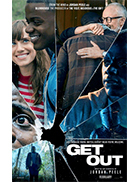Get Out
|  Get Out, the writing and directing debut of Jordan Peele, who is best known as one half of the duo behind the popular Comedy Central sketch show Key & Peele, is a bristling thriller that ably mixes its various horror riffs—which include stalk-and-slash tensions, an insidious cult, and medical horror—with both comedy and social satire. It has a sharp-edged, genre-knowing surface, but what is most intriguing about it is the way it completely inverts the traditional role of race and racial tensions in the horror film, thus carving out new territory in a genre that all often just recycles what has worked in the past. Race and ethnicity have long been an element of cinematic horror, although usually as metaphor for menace, contagion, corruption, or some other threat to civilized society as understood by a predominantly white audience. Looking back at the earliest years of the genre, we can see how Count Orlok in F.W. Murnau’s groundbreaking Nosferatu (1922) was a caricature of the perceived Jewish threat in Weimer Germany; the titular count in Todd Browning’s Dracula (1931) can be similarly viewed as an exotic menace to western culture; monstrosities from the manmade monster in Frankenstein (1931), to the ape-like Hyde in Rouben Mamoulian’s version of Dr. Jekyll and Mr. Hyde (1931), to the giant ape himself in King Kong (1933), have been read as metaphors for the supposed threat posed by black men to white women and a culture of racial purity. Race is rarely explicitly mentioned in horror films, and when it is, the racial and ethnic “others” are usually cast as the monster, such as in Candyman (1992), whose vengeful slasher is the spirit of a post-Civil War black man gruesomely lynched for impregnating a white woman. There are, of course, exceptions, such as Ben, the black protagonist in George A. Romero’s Night of the Living Dead (1968), whose circumstance of being trapped in a farmhouse surrounded by reanimated corpses is exacerbated (although never explicitly stated as such) by the distrust and aggression of the white people around him and the paramilitary groups outside “hunting” the zombies. Similarly, Blacula (1972), an early Blaxploitation horror film, presented its vampiric protagonist as an opponent of African slavery who is tragically made undead because of his attempts to curb it. And, of course, there have been art-house oddities like Bill Gunn’s Ganja & Hess (1973) that have mixed race and horror in various ways. I offer that brief historical background to best contextualize what Peele has achieved in Get Out, which is nothing less than a complete subversion of the way race is typically employed in the horror film, with various racial and ethnic minorities turned monstrous and needing to be defeated (or at least contained) by the white protagonists. In Get Out, the protagonist is an African American who finds himself increasingly concerned about the intentions of all the white people around him. In effect, polite, wealthy white society—with its exurban enclave homes, manicured lawns, polished SUVs, and country club lifestyles—become the film’s raging monster, a cult-like entity that hides malevolent, selfish desires behind a façade of civility and inclusiveness. Because the film is told from the perspective of a young, black American, one who is conventionally successful and seemingly confident in his place in the world, yet still must constantly address his racial status (something that white people almost never have to do because theirs is assumed to be the inherent order of things), it can take whiteness and everything associated with it and, with some obvious exaggeration, turn it into a monstrous threat that wants to devour and control anything that is different. The plot centers around the long-standing social ritual of a girl bringing her boyfriend home to meet the parents for the first time. In this case, the boyfriend is Chris Washington (Daniel Kaluuya), a twentysomething black photographer who is dating Rose Armitage (Allison Williams), a white woman who hails from a wealthy family in upstate New York. Her father, Dean (Bradley Whitford), is a neurosurgeon, and her mother, Missy (Catherine Keener), is a psychiatrist who specializes in hypnosis. Chris is understandably wary about meeting the parents, not just for the usual reasons that wracked poor Greg Focker in Jay Roach’s 2000 comedy, but because they don’t know he’s black and he worries that they will not approve. His best friend Rod (LilRel Howery), who works for TSA, warns him that he’s stepping into a field of landmines, but Chris is determined to make it work (Rod provides both comic relief and plays the role of the perennial outsider who understands what is happening and is studiously ignored by the authorities). Rose assures Chris that her parents are not racist and that her father would have voted for Obama for a third term if he could, which has become the mid-2010s proof of non-racism, replacing the long-standing “But I have black friends …” trope. Yet, when Chris arrives at the Armitages’ enormous house, there are small signs that something isn’t quite right (the film’s debt to 1968’s Rosemary’s Baby and 1975’s The Stepford Wives, both of which were second wave feminism-era films about women gradually recognizing their entrapment by the ruthless and conniving men around them, is strong). The self-conscious way that Rose’s father tries to incorporate black slang into his speech and his overly pronounced denunciation of Hitler’s racial politics during the 1936 Berlin Olympics is discomfiting, but also explainable as the awkward efforts of a white guy to talk with his daughter’s black boyfriend. However, the presence of the Armitage’s domestic help, a woman named Georgina (Betty Gabriel) and a man named Walter (Marcus Henderson), is infinitely more unnerving, not only because of the obvious issue of two black people working for a prominent white family in way that recalls the antebellum South, but because they seem, for lack of a better word, zombified. Their chipper mood, forced smiles, and overly pronounced manner of speech (they sound like Eddie Murphy when he imitated uptight white people) suggest to Chris that all is not well, a feeling that is reinforced even further when he meets Andrew Logan King (Lakeith Stanfield), the one black attendee at the Armitages’ annual party. To reveal any more would devastate the film’s effectiveness, as so much of it hinges on Peele’s careful and deliberate revelation of the actual stakes and just how deep the danger goes. Key here is the fundamental fear of losing one’s identity, which Peele ties specifically to race. Loss of identity has long been a staple of the horror film, especially as it converged in the 1950s with science fiction, giving us one of the true classics of the genre, Invasion of the Body Snatchers (1956), which itself was rife with McCarthy-era political subtext. Like that film Get Out dramatizes how terrifying it can be to feel alone, isolated, and threatened from all sides. That Peele suggests in no uncertain terms that this is how African Americans (and, by proxy, other racial, ethnic, religious, and sexual minorities) often feel is sure to ruffle some feathers, especially among those who insist that Obama’s election is evidence that we live in some kind of post-racial world and among those who fundamentally misunderstand the power dynamics inherent in racism and will therefore charge that Get Out is “reverse racist.” It is, in fact, quite the opposite: A near-brilliant deconstruction of facile racial politics wrapped up in a classic assortment of horror film tropes that Peele understands with enough clarity to deploy with razor-sharp effectiveness and depth to subvert when the time is right. Copyright © 2017 James Kendrick Thoughts? E-mail James Kendrick All images copyright © Universal Pictures |
Overall Rating: 


 (3.5)
(3.5)


